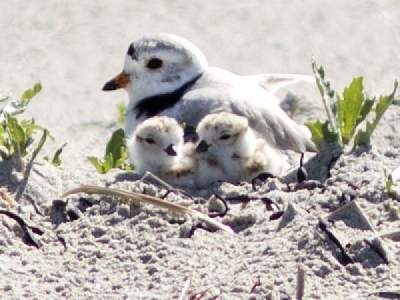
Posted on May 31, 2018
By Liz Gotthelf, Journal Tribune
The City of Saco and a number of coastal residents will need to sign off on a beach management agreement to protect piping plovers and other threatened and endangered birds before the city can receive sand from an upcoming Saco River dredging project.
The U.S. Army Corps of Engineers is expected to start work in November on the second half of a project to dredge the Saco River. The corps plans to use sand from the project to replenish a stretch of eroded coastline in the Camp Ellis area. U.S. Army Corps of Engineers Project Manager Craig Martin said at a recent public meeting it’s estimated the sand would bolster the beach by about 100 feet, and the replenishment could last four to five years.
However, city officials say the corps will not agree to replenish the beach in Camp Ellis unless the city signs a beach management agreement with the U.S. Fish & Wildlife Service and Maine Department of Inland Fisheries and Wildlife. The management agreement would protect piping plovers and roseate terns — federal threatened species and state endangered species, least terns — a state endangered species, red knots— a federal threatened species — and other migratory shore birds from predators and human-related activities and harm.
The plan would be in place from April 1 to Nov. 15, and some provisions would be in effect only when birds are nesting.
City officials discussed the proposed plan in a workshop on Monday night and the plan is likely to come to the council for a vote in June.
Under the terms of the proposed agreement, piping plover nesting areas would be monitored by a piping plover coordinator and volunteers at least three times a week during nesting season, and lifeguards would be cross trained as spotters.
Kite flying would be prohibited within 650 feet of plover nests and volleyball would not be allowed within 150 feet of plover nests and chicks, under the terms of the proposed agreement. Guidelines would be in place for beach cleaning and trash pickup during times plovers are nesting.
The proposed agreement would also impact city ordinances regarding dogs and horses on the beach.
Currently, by city ordinance, dogs must be under leash control on the beach between 9 a.m. and 5 p.m. during July and August. All other times during the summer, dogs on the beach can be on leash or under voice control. Under the terms of the proposed agreement, dogs would have to be under leash control within 1,000 feet of piping plover nesting activity.
Horses would not be allowed to be ridden on the beach between April 1 and September 30 under the proposal. This would extend the period horses are not allowed to be ridden on the beach, as they are currently cannot be ridden on the beach between May and September 15.
Brandon Pettit, the city’s grants and project manager, said the city had discussed a similar document in the past, but it was time to “dust this back off” and sign off on an agreement.
“For the city’s purposes, we really have to enter into this beach management agreement, or the Army Corps of Engineers isn’t going to do the beach nourishment,” he said.
Should the city sign off on an agreement, it wouldn’t go into effect until after this summer and then it would be in place for three years, according to city officials.
“We want the sand, we want to address the coastal erosion, this is the document that we have to be willing to accept,” said Public Works Director Patrick Fox. He said the city also needs to get signatures from about 20 coastal property owners.
Source: Journal Tribune





